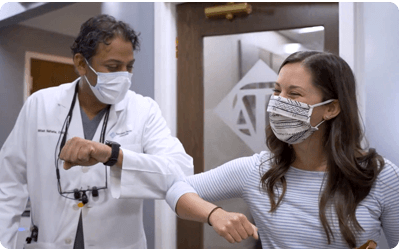Dental implants have gained popularity in recent years as the public has become more aware of their ability to permanently replace one or more missing teeth.
Their natural appearance and ability to restore form and function to a person’s bite make them the next best thing to natural teeth.
Before proceeding, it may be helpful to watch this refresher on dental implants:
There are two categories of dental implants: conventional and immediate load. To appreciate the benefit of immediate load implants, let’s first briefly explain the conventional implant route.
What is the process for a conventional dental implant?
A conventional implant is placed into your jawbone to serve as a replacement for the root of your missing tooth. In many cases, after placing the titanium implant, we must allow an appropriate amount of time for your body to heal around it. This ensures that your implant is strong enough to eventually support an abutment and a ceramic crown. This process is known as osseointegration and typically takes three to six months.
Although this is a good solution to a missing tooth, patients sometimes view this process as inconvenient. Sometimes patients feel anxiety over the fact that they still have a missing tooth during the waiting period. Naturally, many patients want not only a permanent solution, but an immediate one.
What is the process for an immediate load implant?
Just as its name suggests, an immediate load implant does not require a waiting period prior to getting restored with a temporary crown. Typically, immediate load implants are restored directly after they are placed.
Don’t immediate load implants have to osseointegrate, too?
Immediate load implants are no different in design or makeup from conventional implants. In fact, there is no distinction whatsoever between the two. What makes an implant “immediate load” is determined only by when it is restored. Because of this, immediate load implants osseointegrate over time, just as conventional ones do.
So why can some implants be loaded immediately, but others have to wait three to six months?
What determines whether an implant can be loaded immediately is dependent on two factors: how much force it is expected to take, and how stable the implant is at the time of placement. For instance, an implant in the back molar region would be a poor candidate for immediate load because the force of chewing is much greater in the back of the mouth. On the other hand, an implant replacing a missing tooth in the front of the mouth may be a good candidate for immediate load, as the forces in this area of the mouth are much easier to control. At Tewksbury Dental Associates, we use diagnostic tools such as CT scans and 3D printed surgical guides to help us predict which implants may be immediately loaded with temporary crowns. Special tools used during the placement of the implants can also help us confirm whether the bone is dense enough to support a temporary crown at the time of placement.
You said “temporary crown.” Why not go right to a permanent one?
While modern techniques often allow us to restore your implant with a temporary crown immediately after placement, we want to allow your bone and tissue to heal fully before making your permanent crown, as both of these factors can play a large role in the appearance of your final restoration.
How do I know if I can have an immediate load implant?
It is important to know that not every patient is a candidate for immediate load implants, and this restoration type is not ideal for every missing tooth. The ideal candidate is someone who is in good dental and general health. While we can often predict prior to implant placement which cases may be immediately loaded, the decision ultimately depends on the stability of the implant directly after it is placed. If the surgeon feels that the implant will heal better and more predictably without an immediate crown, then we will let it heal conventionally and provide you with an alternative temporary option.
The bottom line is we will never let you leave our office without a front tooth!
If you would like to learn more about dental implants, please call our office to schedule a consultation. We can offer treatment recommendations and answer any questions you might have.






